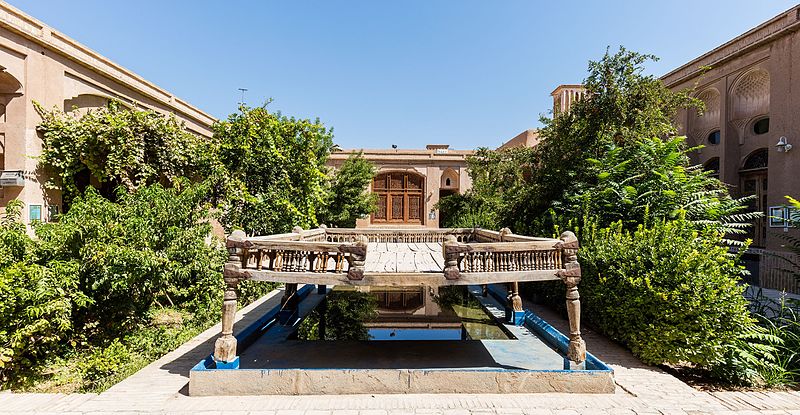|
Not Everyone in Esfahan is Interested in Art History Unknown Qajar House, Esfahan, similar to Lariha House, Yazd, c. 1869 The street is full of washing machines. I am walking in an alley north of Hafez Street in Esfahan, where the cool, airy passages of the Safavid bazaar spill out onto muddy streets bristling with cleaning products and white goods. The shadow of the Friday Mosque’s minaret lengthens over Aabsal, Pakshoma, Daewoo, Samsung. From between two shops, an old man beckons to me. He is simply dressed in a collarless shirt and a worn, but well-fitted, grey jacket. "Salom, xanom – beya," he calls. The doorway that he is sitting in belongs to an older city of Persian spice, silk-traders, and nightingales. Wooden and arched, the threshold has two door-knockers – a heavy one for men to hammer and a lighter one for women to touch, so that the wrong person will not answer. It looks like the door to another world. The old man takes out a key and opens the lock. "Come, madam," he repeats, "You and your friend too. Peace to you both. How is your health?" We go in. The cobbled floor runs downwards to a round hall; from its low, domed, dusty roof a lamp hangs, unlit. We follow another passage to the right and emerge into an enclosed garden. My friend is a Scotsman who spends half the year on oil rigs and half travelling the world on a shoestring snapped and retied in five places. "Ezdevâj kardid?" our guide asks, "Are you married?" – I have been here a week and I already know that one. No, I am not married, and no, I really couldn’t explain why not, but if I were, it certainly would not be to this man who has tried to borrow money from me twice in as many days. The garden is abandoned, overgrown with desiccated ivy in places, but mainly just empty; the ground is dirty and the fountain is dry. Away from the street, the silence is lucent. Our guide starts to talk. I am lost within seconds, but he is either unable or unwilling to believe that we cannot follow his fluent commentary. Embarrassed, I nod hopefully and enthusiastically until, finally, he leads us up a stairway and into a large room with three filigree windows open to the sky. The paper is coming away from the white walls in great sticking-plaster swathes, like lace petticoats torn from a vintage wedding dress; mirror fragments set in the ceiling glimmer with the diamond light of a fairy tale. The paper left on the walls is covered with miniature paintings: elegant women and pastoral scenes. I recognize a Renoir, copied in diminished detail: Jeunes Filles au Piano, transmuted but unmistakable. I’m intrigued. What are they doing here? In a city whose decoration so far has been lavishly geometric, tile upon turquoise tile, soaring pattern picked out with the intricate name of god, these representational images, secular and wholly foreign, are out of place and, to me, weirdly familiar. The old man grabs my arm, breaking the law by the way. "Mal-e ke," he says urgently, "Mal-e ke." For some reason I remember, correctly as it later turns out, that malek means king in Arabic. Maybe, I think, it is one of the many Arabic loan words into Farsi and means royal here in Iran too. "He’s saying these are royal apartments," I say confidently to my loan-shark companion. I smile at the old man, delighted to have seen this derelict paradise, and relieved to have understood. Still grasping my arm, he leads us back to the street and, refusing money or thanks, ushers us out into the world of household appliances, with motorcycles stuttering through the pervasive rubbish. This was in my first week in Esfahan. Later, I found a library in the Office of Scientific and International Co-operation at the university, and I discovered that these courtyard houses with white, picture-encrusted walls are far from unusual: they are a common late nineteenth-century design, the copied paintings – often actual postcards or European fashion plates, pasted to the walls – a symptom of Iran’s tense but covetous relationship with the West. Later still, my Farsi improved and I realized that mal-e ke is not derived from Arabic at all; it is a compound simply of mal– property – and ke– whose. The gentleman in the grey jacket was asking whose property I was, to whom I belonged. His interest in art history was less than I had thought, and his curiosity about my marital status much greater. When I went back to see the house again – alone this time – the doorway was gone, or at least I could not find it. But for the rest of my stay I listened more carefully, trying to hear not what I wanted to be told but what was really being said. Sophy Downes A Cambridge native, Sophy lives in Rome, where she teaches archaeology by day, writes by night, and stalks the Romantic poets whenever she can.
2 Comments
Ron Sheets
9/18/2021 08:17:14 am
Great article. I find your take on history informative and refreshing. Just finished watching a show on science Channel about ancient Persia you were in. Thank you. Nice to see a lady with such a passion about her work who also has beauty to match.
Reply
Your comment will be posted after it is approved.
Leave a Reply. |
The Ekphrastic Review
COOKIES/PRIVACY
This site uses cookies to deliver your best navigation experience this time and next. Continuing here means you consent to cookies. Thank you. Join us on Facebook:
July 2024
|




